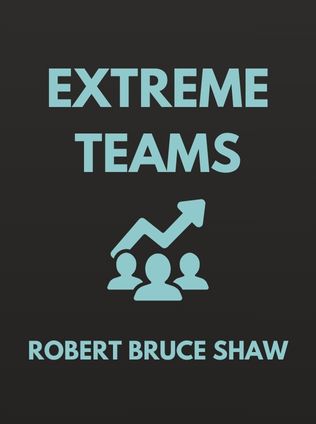
Extreme Teams
Why Pixar, Netflix, Airbnb and Other Cutting-Edge Companies Succeed Where Most Fail
By Robert Bruce Shaw
Published 02/2017
About the Author
Robert Bruce Shaw is an acclaimed management consultant specializing in leadership effectiveness and team dynamics. With a doctorate in organizational behavior from Yale University, Shaw's insights are grounded in extensive academic and practical experience. His previous works, including Trust in the Balance and Leadership Blindspots, have established him as a leading voice in understanding the complexities of organizational behavior. Shaw's work focuses on helping leaders and their teams achieve peak performance, making him a sought-after consultant and speaker in the business world.
Main Idea
In Extreme Teams: Why Pixar, Netflix, Airbnb, and Other Cutting-Edge Companies Succeed Where Most Fail, Robert Bruce Shaw explores the innovative practices that define some of the world's most successful companies. Shaw argues that traditional team-building practices are outdated and ineffective in today's fast-paced, innovative environments. Instead, he presents a new paradigm for creating and managing high-performing teams, drawing on examples from companies like Pixar, Netflix, and Airbnb. These companies have redefined team dynamics, emphasizing a blend of communal and exchange relationships, a relentless focus on results, and an obsession with their work and culture. Shaw's analysis provides a roadmap for leaders seeking to build teams that not only excel but redefine industry standards.
Table of Contents
- Revolutionizing the Way We Work
- Potential Problems in Designing Teams
- Communal and Exchange Relationships
- Results and Relationships
- Foster a Shared Obsession
- Value Fit Over Capabilities
- Focus More, Then Less
- Creating Context
- Innovations and Experimentations
- Push Harder, Push Softer
- Teams at the Extremes
- Why Teams?
Revolutionizing the Way We Work
Shaw begins by examining how companies like Whole Foods and Netflix have transformed traditional workplace norms. These companies focus on creating environments where employees are empowered and feel a sense of ownership over their work. Whole Foods, for instance, believes that people are naturally social beings who thrive in small, cohesive groups. This philosophy is embedded in the company's structure, where every employee is part of a team, fostering a sense of belonging and maximizing their contributions to the business's success.
Transparency and openness are also key elements in these companies' strategies. Whole Foods' "no secrets" policy ensures that information about the company's strategies and operations is accessible to all employees, creating a high-trust culture. Shaw writes, "The firm believes that creating a high-trust culture requires sharing information that is concealed in most firms—and working with people to ensure that they understand the implications"【9:1†source】.
Sign up for FREE and get access to 1,400+ books summaries.
You May Also Like
The Life-Changing Magic of Tidying Up
The Japanese Art of Decluttering and Organizing
By Marie KondoThe Lean Startup
How Today's Entrepreneurs Use Continuous Innovation to Create Radically Successful Businesses
By Eric RiesWho Moved My Cheese?
An Amazing Way to Deal with Change in Your Work and in Your Life
By Spencer Johnson, M.D.Make Your Bed
Little Things That Can Change Your Life...And Maybe the World
By William H. McRaven



















